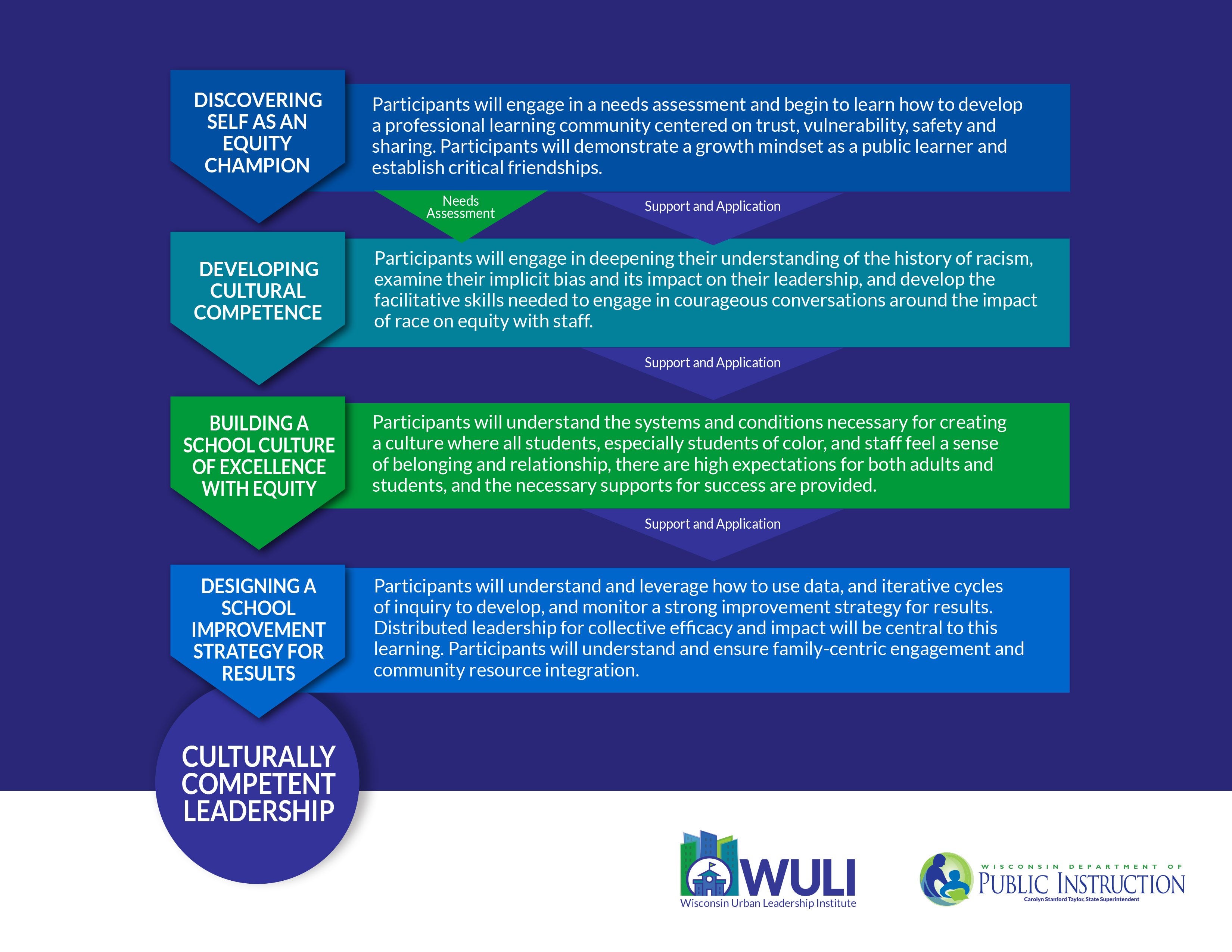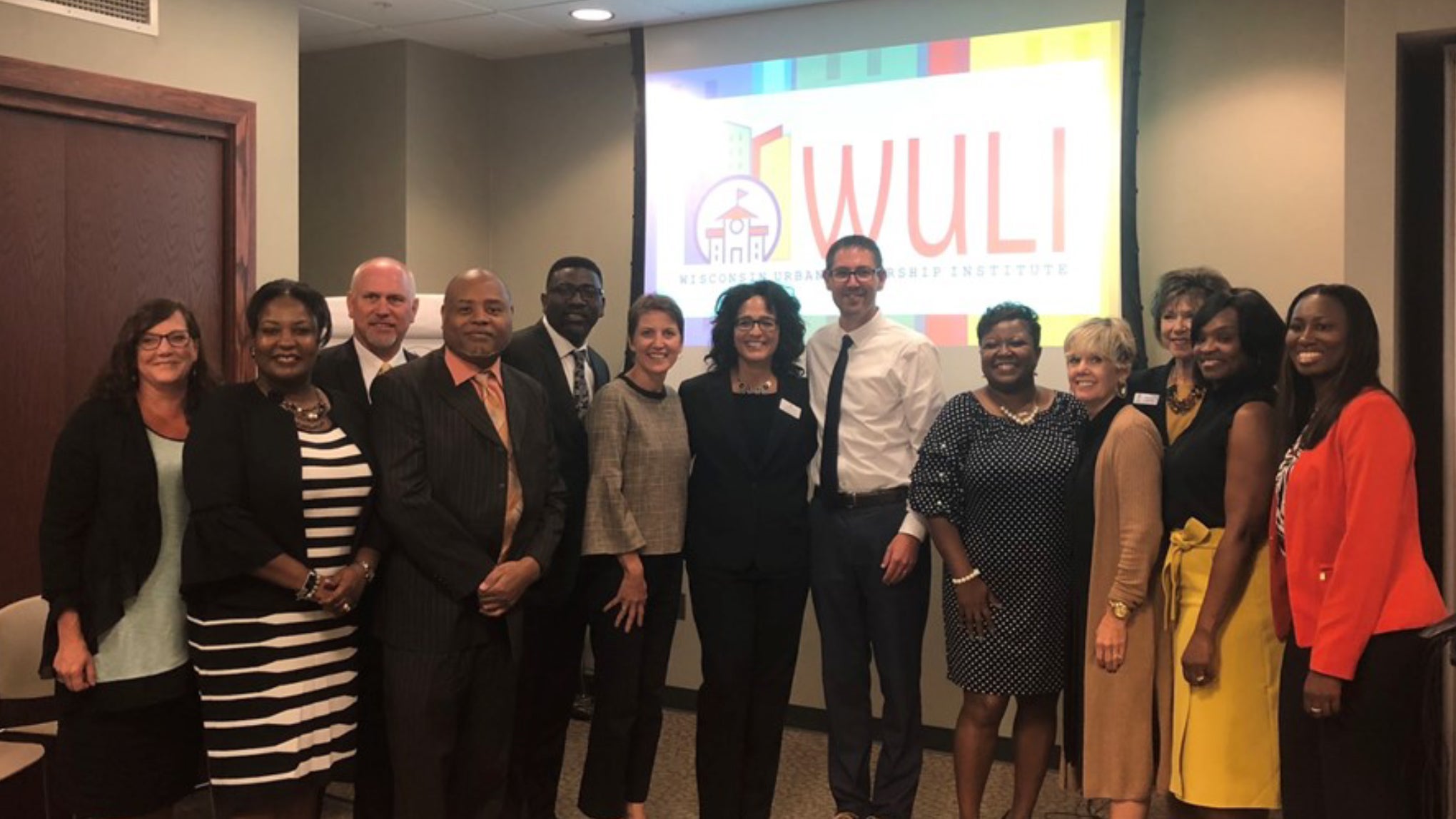Back in 2016, the Wisconsin Department of Public Instruction (DPI) committed to using federal funding to support school leaders. Those involved knew immediately that they needed the right voices at the table to help determine what that support would look like.
Enter “The Big 5.”
The five largest school districts in Wisconsin–known as “the Big 5”--along with the Urban League of Greater Madison and the Association of Wisconsin School Administrators, signed on to the project. They began by participating in frank and open conversations with DPI about what school leaders in those districts needed to best support their students. DPI quickly recognized the need for professional development specifically geared toward school leaders in the Big 5 districts (Green Bay, Kenosha, Madison, Milwaukee and Racine).
“There are unique characteristics and challenges that each of the big five districts face that the rest of the state wouldn’t face,” said Eric Gallien, superintendent of Racine Unified School District. He noted that the big five districts have their own specific, complex cultural and economic needs. They are also home to the majority of the state’s lowest-performing schools.
An Institute Is Born
The creation of an ongoing, two-year professional development program for principals that would become the Wisconsin Urban Leadership Institute (WI-ULI) became the focus of the team’s work. Members of the team were part of a Wallace-supported initiative called the ESSA Leadership Learning Community (ELLC). The initiative brought together 11 state teams that included representatives from districts, community groups, and state agencies to promote effective school leadership. Additionally, the Wisconsin team moved quickly to partner with the New York City Leadership Academy, which has supported the development of thousands of principals in school systems across the country with a focus on equity. NYCLA helped to develop the curriculum for the institute and the ELLC team worked to “Wisconsin-ite” it , aligning it to state professional development and leadership standards.
Along with the Urban League and an outside facilitator from 4AM Consulting, the participating district leaders developed a set of competencies for successful principals in their schools that would serve as the framework for the institute.

The group identified four competencies of culturally competent school leaders and created a corresponding framework to help principals develop those competencies. The four competencies and equity dispositions are:
- Designing a school improvement strategy for results
- Discovering self as an equity champion
- Developing cultural competence
- Building a school culture of excellence with equity
The institute’s two-year curriculum for principals focuses on monthly training, coaching, a capstone project and networking opportunities during the first year. Year two focuses on cohort coaching and continued networking opportunities.
The institute launched in September 2018 with its first cohort of 27 principals from the Big 5 districts. Each district determined how it would select principals to attend; some, like Kenosha, had an application process, while other districts made the selections within the central office. WI-ULI quickly gained support from local and national partners and businesses: Northwestern Mutual hosted planning meetings in its offices and the Educators Credit Union ran sessions about personal finance management and even hosted a virtual “paint and sip” event for participants.
The institute remained flexible and responsive through societal upheavals such as the COVID-19 pandemic and the racial justice uprising following the murder of George Floyd. In fact, the institute became a place where principals could connect and learn from each other about how to face these momentous challenges, noted Alisia Moutry, project manager and lead facilitator for the ELLC team.
“It was nice to have a learning community to be that critical friend,” Moutry said of the shared ideas and best practices that emerged from the institute.
Similarly, building camaraderie and mitigating isolation were major benefits for participating principals from Gallien’s–the Racine superintendent–viewpoint.
“The greatest opportunity is getting to collaborate and learn from other leaders in similar settings,” Gallien said. “They see that the challenges they face are not unique to them.”
Reflection on policy and practice was also a key component of the institute’s curriculum. For example, principals learned how to analyze data on their students from historically marginalized groups and how to lead meaningful conversations about racial equity with their school staff. Participants also had the opportunity to analyze and discuss policies that prevented them from leading with equity, which opened up conversations with the state about issues such as inequitable funding. And participants also reflected on their own practices, biases and expectations for students and teachers.
“There was a lot of bravery in principals being really honest about what they learned about themselves,” said Leslie Anderson, senior managing director at Policy Studies Associates and documenter for the ELLC team.
ELLC facilitator Moutry spoke highly of the partnerships that have supported the institute so far and suggested engaging even more partners through dedicated outreach. She believes the work of the institute already aligns with the missions of many organizations and businesses that want to support education–the connection just needs to be made for them sometimes.
Looking to the Future
To date, 89 principals have completed WI-ULI. Initial evaluations of the program have been positive, with nearly all participants surveyed reporting that the institute has positively affected their practice. The state has committed to funding and supporting the institute for the next ten years. Meantime, there are lessons in Wisconsin’s experience for other states.
“Myles Horton (an educator and activist during the Civil Rights Movement) said, ‘It’s a hard truth, harder to live by than the golden rule: the people who have the problem likely have the solution,’” says Mary Dean Barringer, a consultant on the project. “The [state education agency] put money out there and said, ‘We’re going to learn from the people who have the problem; can we create a situation where they’re allowed to come up with a solution?’”
The agency did just that by convening the districts who were calling for improved professional development for principals to not just inform, but lead on the development of a solution.
As for the future of WI-ULI and principal development in Wisconsin, members of the team have a range of hopes and goals that include the desire to see similar programs implemented for rural and suburban districts.
Additionally, Anderson would like to see formalized processes for participating principals to communicate with the state department about inequities in policy and practice. This would help provide principals with assurance that their work matters, she said, and help ensure that they are changing what needs to be changed so their students can thrive in school.
“The ultimate goal is to create better student achievement,” Gallien says of his hopes for the institute’s lasting effects. “And enhance school culture as well.”



